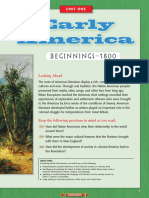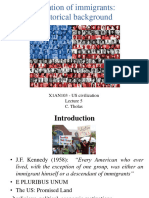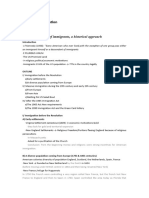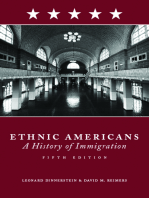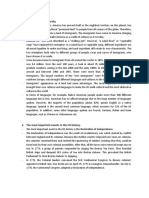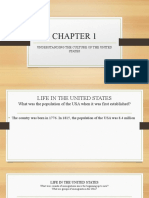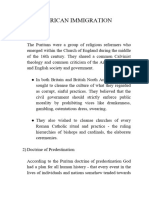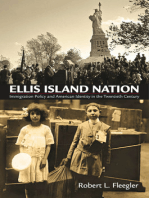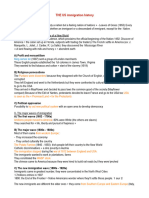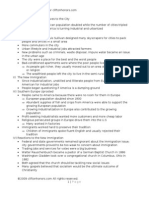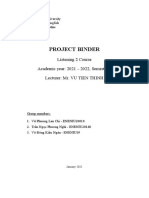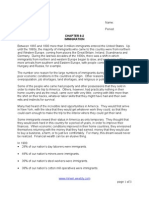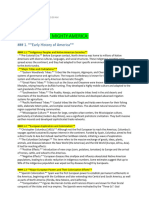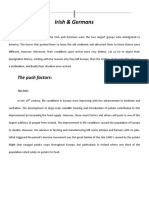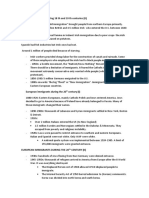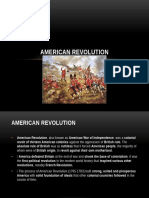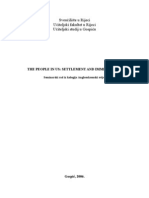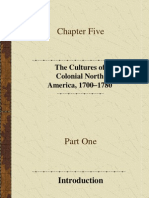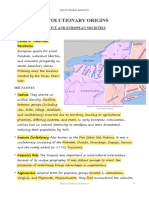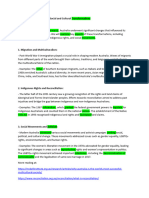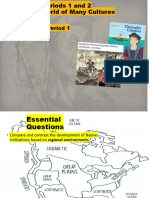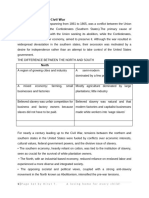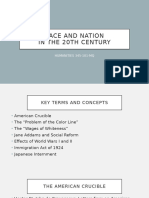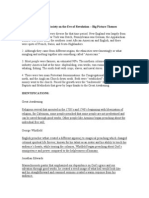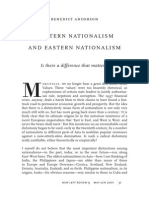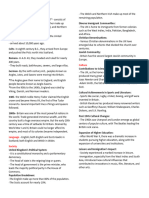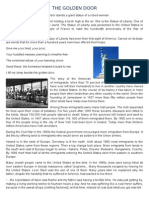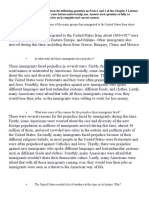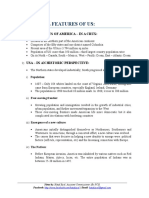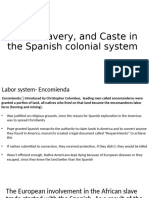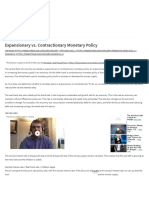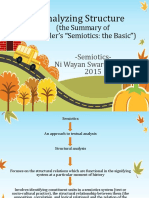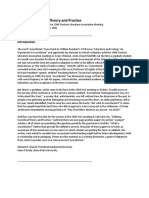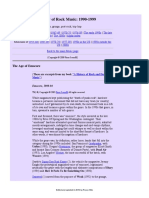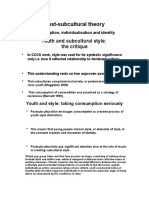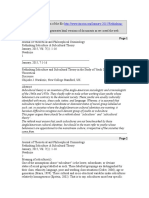The Immigrant Experience 2
The Immigrant Experience 2
Uploaded by
Akhmad Alfan RahadiCopyright:
Available Formats
The Immigrant Experience 2
The Immigrant Experience 2
Uploaded by
Akhmad Alfan RahadiCopyright
Available Formats
Share this document
Did you find this document useful?
Is this content inappropriate?
Copyright:
Available Formats
The Immigrant Experience 2
The Immigrant Experience 2
Uploaded by
Akhmad Alfan RahadiCopyright:
Available Formats
The Immigrant Experience
Aulia Rahma
(105110104111002)
First arose in the 1840s and 1850s when the numbers of
immigrants rose significantlu due to economic change in
Europe and America, famine, political and religious dissent.
Letters from an American Farmer (1782), St John De
Crevecour had explained to Europeans that from a
promiscuous breed of English, Scots, Iris, French, Germans
and Swedes that race now called Americans had arisen.
Immigrant experiences were very varied but all were shaped
by a number of factors.
There was what may be called the cultural distances to be
travelled least in the case of the immigrants from British
Isles who spoke the same language as their new fellow
inhabitants and who had common histories and who had
common histories and traditions, including in most cases a
common Protestantism.
The immigrant of the 1840s and 1850s found the society that
was unsure of itself and therefore particulary hostile.
1924 1929 anxieties diminished, especiallu when the Great
Depression of the thirties made the United State.
The Immigrant Act of 1965 had strongly affected patterns of
immigration.
Asia and Latin America were now providing the vast bulk of
immigrant, not Europe.
Before 1965 Europe was major source of immigrant.
1820 and 1965, 81.1% Europe; 2.8% Asia; 13.6% North
America (Include Mexico, Central America and the Caribbean);
1.5% South America; 0.05% Africa; last 1.1%
elsewhere.
Over 100,000 German Born were settled in New York,
Illinois, Ohio, Wisconsin, Pennsylvania and Missouri.
UPROOTING and REROOTING
US has been in three minds about immigrant : begin
with preached, pursued Ando conformity, desire to
make the immigrant conform in every possible way
to the host culture.
In reality it was very unlikely that immigrants could
achieve full structural assimilation, defined as a full
integration into the intimate, personal relationship
of the host society.
One of the most important reason for living close to
others of ones own kind was to belong to burial
society.
You might also like
- Apush CH 5-8 Study GuideDocument13 pagesApush CH 5-8 Study Guideapi-235754768No ratings yet
- Early AmericaDocument157 pagesEarly AmericaBiljanaLNo ratings yet
- Immigration Industrialization and UrbanizationDocument94 pagesImmigration Industrialization and Urbanizationdodo demyanaNo ratings yet
- Oana Chirita - American ImmigrationDocument10 pagesOana Chirita - American ImmigrationAndreea ŞoldanNo ratings yet
- Overview of US Culture and HistoryDocument11 pagesOverview of US Culture and HistoryHamza DahmaniNo ratings yet
- TEST SỐ 9Document4 pagesTEST SỐ 9Vy NgôNo ratings yet
- A Nation of Immigrants Historical Background Update 2023Document11 pagesA Nation of Immigrants Historical Background Update 20236yvvxxy7vnNo ratings yet
- 1st Wave US ImmigrationDocument32 pages1st Wave US ImmigrationRui MiguelNo ratings yet
- American Civilization 2Document3 pagesAmerican Civilization 2zheyiduNo ratings yet
- The US Cultural DiversityDocument4 pagesThe US Cultural DiversityPhạm Ngọc MaiNo ratings yet
- Photo Essay PresentationDocument13 pagesPhoto Essay PresentationB_LeeveNo ratings yet
- Understanding The Culture of The United StatesDocument8 pagesUnderstanding The Culture of The United StatesDuc NguyenNo ratings yet
- american immigrationDocument12 pagesamerican immigrationbulatkinga3No ratings yet
- Screenshot 2023-03-30 at 10.17.39Document16 pagesScreenshot 2023-03-30 at 10.17.398yy7hvcds8No ratings yet
- Ellis Island Nation: Immigration Policy and American Identity in the Twentieth CenturyFrom EverandEllis Island Nation: Immigration Policy and American Identity in the Twentieth CenturyNo ratings yet
- The US Immigration HistoryDocument2 pagesThe US Immigration Historylilanola3No ratings yet
- Notes On "A Nation of Immigrants" - John F. KennedyDocument17 pagesNotes On "A Nation of Immigrants" - John F. KennedyAisha RahatNo ratings yet
- APUSH Chapter 25 Study GuideDocument8 pagesAPUSH Chapter 25 Study GuideAl JohriNo ratings yet
- Project BinderDocument36 pagesProject BinderNghi PhuongNo ratings yet
- Apush Midterm EssayDocument2 pagesApush Midterm Essayapi-311220399No ratings yet
- History, U.S. Honors - CH 8-2 LectureDocument3 pagesHistory, U.S. Honors - CH 8-2 LectureMarty IrwinNo ratings yet
- E E I D N A: Vents AND Conomics Nfluencing THE Evelopment OF Orth MericaDocument7 pagesE E I D N A: Vents AND Conomics Nfluencing THE Evelopment OF Orth Mericawinter0011No ratings yet
- The Mighty AmericaDocument14 pagesThe Mighty Americanasirabbaskashif325No ratings yet
- Chapter 9 - ImmigrationDocument23 pagesChapter 9 - Immigrationmimorietoka012No ratings yet
- Irish & Germans: The Push FactorsDocument6 pagesIrish & Germans: The Push FactorsSimo E HouboubNo ratings yet
- The Colonial American Economy 1Document30 pagesThe Colonial American Economy 18016 Anamika kumariNo ratings yet
- Sociedades Unit 4 y 6Document5 pagesSociedades Unit 4 y 6Carol RoNo ratings yet
- 01 - Hen - 62815 - CH01 - 001-039 - David Carreon PDFDocument39 pages01 - Hen - 62815 - CH01 - 001-039 - David Carreon PDFanon_695610124No ratings yet
- USA: Melting Pot or A Salad Bowl?Document2 pagesUSA: Melting Pot or A Salad Bowl?Für AnikóNo ratings yet
- American RevolutionDocument98 pagesAmerican Revolutionprepcareer.designNo ratings yet
- Apush - Long Essay QuestionDocument2 pagesApush - Long Essay Questionapi-313910448No ratings yet
- Life in The United States: A Nation of ImmigrantsDocument8 pagesLife in The United States: A Nation of Immigrantsletuananh.lqdNo ratings yet
- American Studies: UFES - 2012/1Document13 pagesAmerican Studies: UFES - 2012/1maria4040No ratings yet
- The People in Us: Settlement and ImmigrationDocument14 pagesThe People in Us: Settlement and ImmigrationIvicaNo ratings yet
- Câu 1. The US Culture Diversity?: 1. American RevolutionDocument8 pagesCâu 1. The US Culture Diversity?: 1. American RevolutionLe Giang100% (1)
- 18th C Colonial America 1700-1763Document9 pages18th C Colonial America 1700-1763melissaNo ratings yet
- Title The First Americans A Brief Study NoteDocument8 pagesTitle The First Americans A Brief Study Noteaycaozer04No ratings yet
- Lecture ch05Document30 pagesLecture ch05api-171412573No ratings yet
- Barnes Hist 1301 KC Col Am C456 BasicDocument29 pagesBarnes Hist 1301 KC Col Am C456 BasicIzzy GreggNo ratings yet
- Social Studies Summary - 2023Document33 pagesSocial Studies Summary - 2023tiger2103005040No ratings yet
- Topic 4 of HistoryDocument4 pagesTopic 4 of Historytritin0812No ratings yet
- Periods 1 and 2 Powerpoint OutlineDocument141 pagesPeriods 1 and 2 Powerpoint OutlineJoshua74No ratings yet
- Grade 10 Histry NoteDocument12 pagesGrade 10 Histry NotettarsichaNo ratings yet
- 6b TwentiethCenturyDocument39 pages6b TwentiethCenturyDre DreNo ratings yet
- Native AmericansDocument2 pagesNative AmericansmiddletonstudentNo ratings yet
- Chapters 5-8 ApushDocument21 pagesChapters 5-8 Apushapi-236294326100% (1)
- Arab Americans 3Document24 pagesArab Americans 3vape 123No ratings yet
- Ben Anderson - Western Nationalism and Eastern Nationalism PDFDocument12 pagesBen Anderson - Western Nationalism and Eastern Nationalism PDFendry02100% (1)
- APUSH Ch. 14 NotesDocument5 pagesAPUSH Ch. 14 NotesKelsey YoungNo ratings yet
- Gale Researcher Guide for: Native American Resistance to European ExpansionFrom EverandGale Researcher Guide for: Native American Resistance to European ExpansionNo ratings yet
- Sealit ReviewerDocument4 pagesSealit ReviewerYanie Kyle MungcalNo ratings yet
- The Golden DoorDocument4 pagesThe Golden DoorloganzxNo ratings yet
- Academic Lecture Chapter 3234Document2 pagesAcademic Lecture Chapter 3234Zaid Yair Acevedo TorresNo ratings yet
- Class 11 History ch-10 NotesDocument14 pagesClass 11 History ch-10 NotesMudassir AkhterNo ratings yet
- APUSH Chapter 32 NotesDocument5 pagesAPUSH Chapter 32 NotesphthysyllysmNo ratings yet
- American RevolutionDocument10 pagesAmerican RevolutionWaqar Ahmad BiyabaniNo ratings yet
- Physical Features (Notes by Hataf Siyal)Document1 pagePhysical Features (Notes by Hataf Siyal)Paras Shakeel AhmedNo ratings yet
- Labor Slavery and Caste in The Spanish Colonial SystemDocument9 pagesLabor Slavery and Caste in The Spanish Colonial SystembnoutamariaNo ratings yet
- Final - Assignment 1 MPP 801 For Presentation Submit 15 November FinalDocument9 pagesFinal - Assignment 1 MPP 801 For Presentation Submit 15 November FinalAkhmad Alfan RahadiNo ratings yet
- Expansionary vs. Contractionary Monetary Policy - Finance TrainDocument3 pagesExpansionary vs. Contractionary Monetary Policy - Finance TrainAkhmad Alfan RahadiNo ratings yet
- Press Release - Cultural Sailing Vessel Arka Kinari Releases Laut Loud, A Series of Off-Shore Live SessionsDocument2 pagesPress Release - Cultural Sailing Vessel Arka Kinari Releases Laut Loud, A Series of Off-Shore Live SessionsAkhmad Alfan RahadiNo ratings yet
- Analysing StructureDocument41 pagesAnalysing StructureAkhmad Alfan RahadiNo ratings yet
- Cheat Turok 2Document1 pageCheat Turok 2Akhmad Alfan RahadiNo ratings yet
- Defining Ecocritical Theory and PracticeDocument18 pagesDefining Ecocritical Theory and PracticeAkhmad Alfan RahadiNo ratings yet
- SGPP-Indonesia Application Form: Admissions@sgpp - Ac.idDocument10 pagesSGPP-Indonesia Application Form: Admissions@sgpp - Ac.idAkhmad Alfan RahadiNo ratings yet
- Romanticism and Existentialism: History and Sociocultural InfluencesDocument13 pagesRomanticism and Existentialism: History and Sociocultural InfluencesAkhmad Alfan RahadiNo ratings yet
- Subculture Studies in EnglandDocument5 pagesSubculture Studies in EnglandAkhmad Alfan RahadiNo ratings yet
- "-Core" Is The Suffix of Our Time: The Word Form That Named Dozens of Artistic Genres Has Deep Washington RootsDocument2 pages"-Core" Is The Suffix of Our Time: The Word Form That Named Dozens of Artistic Genres Has Deep Washington RootsAkhmad Alfan RahadiNo ratings yet
- Complete Rites of SpringDocument6 pagesComplete Rites of SpringAkhmad Alfan RahadiNo ratings yet
- cpt515 Black Music HistoryDocument8 pagescpt515 Black Music HistoryAkhmad Alfan RahadiNo ratings yet
- Post Subcultural TheoryDocument6 pagesPost Subcultural TheoryAkhmad Alfan RahadiNo ratings yet
- Rethinking Subculture and Subcultural Theory in The Study of Youth CrimeDocument18 pagesRethinking Subculture and Subcultural Theory in The Study of Youth CrimeAkhmad Alfan Rahadi100% (1)
- Engineering Practices Laboratory: by R.Nathan Assistant Professor Department of Mechanical EngineeringDocument13 pagesEngineering Practices Laboratory: by R.Nathan Assistant Professor Department of Mechanical EngineeringAkhmad Alfan RahadiNo ratings yet
- Building Gunpla FinalDocument135 pagesBuilding Gunpla FinalAkhmad Alfan Rahadi100% (2)
- Marvel Future Fight Complete ISO GuideDocument13 pagesMarvel Future Fight Complete ISO GuideAkhmad Alfan RahadiNo ratings yet
- Adorno's LegacyDocument14 pagesAdorno's LegacyAkhmad Alfan RahadiNo ratings yet
- Crazy About You - Reflections On The Meanings of Contemporary Teen Pop MusicDocument15 pagesCrazy About You - Reflections On The Meanings of Contemporary Teen Pop MusicAkhmad Alfan RahadiNo ratings yet
- Dead Soldiers Chairil AnwarDocument10 pagesDead Soldiers Chairil AnwarAkhmad Alfan RahadiNo ratings yet
- Subjunctives: Present byDocument8 pagesSubjunctives: Present byAkhmad Alfan RahadiNo ratings yet
- Text AnalysisSTDocument103 pagesText AnalysisSTAkhmad Alfan RahadiNo ratings yet
- The Victorian AgeDocument14 pagesThe Victorian AgeAkhmad Alfan RahadiNo ratings yet
- Feminist CriticismDocument11 pagesFeminist CriticismAkhmad Alfan RahadiNo ratings yet
- (Objective/Formalistic Approach) Bu JuliatiDocument13 pages(Objective/Formalistic Approach) Bu JuliatiAkhmad Alfan RahadiNo ratings yet
- Persuasive SpeechDocument22 pagesPersuasive SpeechAkhmad Alfan RahadiNo ratings yet

